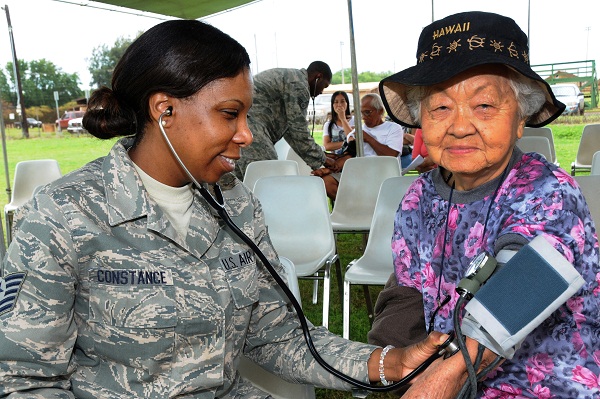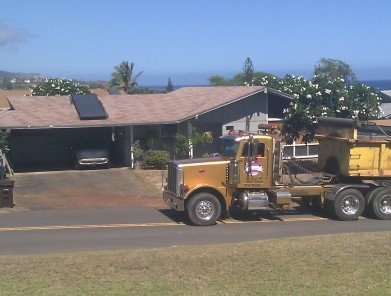Ask the Mayor: Loud Vehicles; High Tide Access
By Mayor Alan Arakawa
Mayor Alan Arakawa answers some of the most-asked questions submitted to his office staff.
Dear Mayor,
Q: What are the laws regarding noise pollution coming from loud vehicles on our increasingly crowded island? Our once-quiet neighborhood is bombarded all day, all night, every day with jacked-up trucks, some with over-sized tires (monster trucks), cars, motorcycles and other types of vehicles with loud mufflers and motors. These vehicles are so noisy that they can literally wake the dead and be heard from a mile away. Where is the enforcement to combat this daily assault (noise pollution) to our eardrums and sanity?
A: The law requires all motor vehicles to have mufflers. The purpose of a muffler is to help control exhaust noise from the motor of a motor vehicle. Maui County Code, Title 10, Article 1, Chapter.10.20.440 prohibits a motor vehicle on a public highway or street unless the motor and/or exhaust system of the motor vehicle is properly equipped and adjusted to prevent the escape of excessive or unusual noise. The ordinance also states that no person shall operate a motor vehicle on a public highway or street with a motor and/or exhaust system that has been altered or modified to such an extent that the noise of the motor and/or exhaust system is excessive or unusual because of a dummy muffler, cutout, by-pass or other similar device. In layman’s terms, anything louder than a stock muffler is a violation. After-market mufflers that are advertised as being legal in all 50 states only meet emission control requirements, not noise requirements. The fine for having a loud muffler is $72. Maui Police Department officers enforce the loud muffler ordinance; the Traffic Section conducted two separate operations last year to address this issue and have plans to address the noise problem again this year. Moped modifications are prohibited by Hawaii Revised Statutes, which state that no moped shall be modified in any manner except as authorized by the motor manufacturer, and any modification shall not increase the power capacity of the motor above 2HP. For more info, visit www.mauicounty.gov/laws and select “Maui County Code.”
Dear Mayor,
Q: Last week I received a plastic bag in my mailbox, asking me to donate to a food drive sponsored by the US Postal Service. I thought plastic bags were banned in Maui County? How come the federal government is exempt?
A: The quick answer to your question is that in this case, the US Post Office is not selling you anything. The more detailed answer refers back to the county ordinance that went into effect on January 11, 2011, which restricts the use of non-reusable plastic bags at the point of sale by any commercial enterprise or establishment, including sole proprietorships, joint ventures, partnerships and corporations, whether for profit or non-profit. This includes all employees of businesses, or any independent contractors associated with the businesses, that provide bags to their customers at the point of sale for the purpose of transporting groceries or other goods. The “Plastic Bag Reduction Ordinance” enacted in Maui County was designed to help protect the environment by drastically reducing the number of plastic bags used on a daily basis by local retailers and consumers. For more information on the ordinance, enforcement and violations, visit www.mauicounty.gov/PlasticBags.

Air Force Tech. Sgt. Jaqueline Constance administers care to a Hawaii resident as part of the Tropic Care exercise. National Guard photo.
Dear Mayor,
Q: Regarding the free health care being offered during the Tropic Care Maui event next month, I know that people are saying that all we have to do to receive free medical, dental and vision services is to show up and stand in line, but what if I need a doctor’s note signed or a signed for saying that yes, my son did get a physical exam. Will those forms be offered there?
A: No. You are responsible for bringing any forms and records that you need signed by medical personnel. The members of the US military that are providing these free clinics do not have these forms on hand, however they have said that they will sign any appropriate forms that people have with them that apply to the services received. These include Dental Health Certificates, DOE Students Health Record-Form 14 Sports/Athletic Physical Examination Form, College Entry Physical Examination Form, Physical Examination form for children and adults to enter foster care homes. If you have any questions about forms call the mayor’s office at 270-7855 and ask to be transferred to the Tropic Care hotline, which is manned by Tropic Care Coordinator and long-time former Council Vice Chair Joe Pontanilla. He can get your answers or refer you to someone who can. www.mauicounty.gov/TropicCare
Dear Mayor,
Q: How can we request for one of those radar feedback signs to be placed in our neighborhood? I live off of High Street near Wailuku Elementary School and although there are 20 mph signs, people still drive faster than that. What’s worse, motorists drive fast as kids are getting out of school. Please help.
A: I understand your concern. You can contact the Maui Police Department at 244-6400 regarding motorist safety concerns, so that the issue can be researched and analyzed. If a hazard is identified the appropriate treatment may be applied, which may include enforcement and/or a speed display sign. Also, for state highways and roads, the Hawaii Department of Transportation has speed display signs available. Like the Maui Police Department, the DOT studies traffic accident data and measures traffic speed flow charts before implementing a speed display sign.
Dear Mayor,
Q: Does the County of Maui receive any of the registration fees for rental cars? If not, why not?
A: The County of Maui receives registration fees for rental cars that are initially titled and registered on Maui; they are issued license plates that begin with the letter “L” (e.g. LDP 550). According to HRS §286-41, if a vehicle is moved to another county, the existing certificate of registration will be valid until it expires. At that point, the registration must be renewed with the county the car is being driven in, unless the car is only being temporarily transferred to another county for less than three months.
Dear Mayor,
Q: I walk from Sugar Beach in Kihei to the fish pond on the beach. At high tide there are two places where the beach is under water, thus pushing the high tide line up against some condos’ rock walls. How are we supposed to get by? There are guest-only signs on the condo property.
A: The state has jurisdiction of coastal land up to the high water mark (also referred to as the vegetation line or the “high wash of the waves”). In this case, it sounds like private property (the condos) abuts state property. Unless permission is given by the private property owners, crossing their property could be considered trespassing. Our Planning Department works to assure both lateral and perpendicular access to private property, which can sometimes be a condition of a permit, subdivision or change in zoning— often there is a dedicated easement or parcel through or right next to a property, specifically for access. It’s important to remember that along some natural, undeveloped coastlines, the beach is impassible during high tide. Since beach access at high tide is not necessarily guaranteed, it’s a good idea to check the tide chart before planning a beach walk.
Want to Ask the Mayor?
Submit your questions about County of Maui programs, services, operations or policies to Mayor Alan Arakawa via email: AskTheMayor@mauicounty.gov, phone: 270-7855 or mail: 200 S. High Street, 9th Floor, Wailuku, Hawaii 96793. Questions submitted will be considered for inclusion in the “Ask the Mayor” column.











